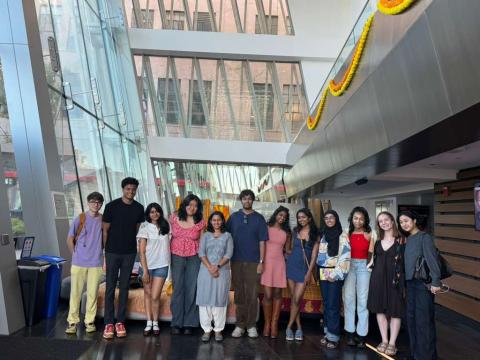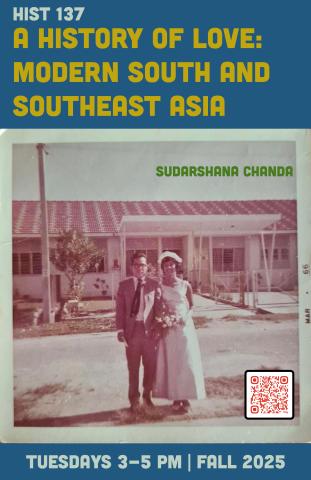A History of Love—Modern South and Southeast Asia Seminar Students’ Conversation with Playwright Mfoniso Udofia
A History of Love—Modern South and Southeast Asia Seminar Students’ Conversation with Playwright Mfoniso Udofia
The Ceremony—world premiere at the Chuang Theater in Boston—is a multigenerational play that weaves together Nigerian and Nepali cultural traditions. When Ekong, the only son of Abasiama and Disciple, asks Lumanti Rathi to marry him, the couple accepts that their dream wedding may have to proceed without either father present—until Lumanti’s dad makes a last-minute reversal. Determined to make the ritual truly whole, Ekong dares to make amends with his long-separated father.
As part of HIST 137: A History of Love—Modern South and Southeast Asia, students attended the world-premiere performances and, on October 3, met via Zoom with playwright Mfoniso Udofia to discuss the work; their brief reviews shaped a conversation that probed interracial love, characterization, and setting. Taught by Sudarshana Chanda, the seminar examines how love is expressed, practiced, and constrained in the nineteenth and twentieth centuries in South and Southeast Asia and their diasporas. Moving through a range of boundary-crossing intimacies—across ethnicity, race, religion, caste, and gender/sex—via diverse primary sources (love letters, matrimonial ads, podcasts, short stories, films), the class equips students with tools to analyze how ideas of love are articulated, contested, and transformed across time and place.

Students described The Ceremony as a powerful, emotionally resonant portrayal of cross-cultural love, identity, and belonging. Many were “in awe” of seeing two non-white cultures placed side-by-side on stage, observing how the play honors both Nigerian and Nepali traditions while acknowledging a shared American upbringing. The unapologetic use of Ibibio, Nepali, and Sanskrit—without translation—was praised as an authentic, intentionally political invitation to lean in. Pop-culture threads (Fresh Prince, J. Cole, Kendrick) read as an emotional manual for Ekong, a first-gen Black/Nigerian American son, helping him articulate masculinity, fatherhood, and becoming. Throughout the exchange, students emphasized family dynamics—matriarchal households, differing sibling memories of the same parent, and a widening empathy for immigrant parents shaped by fear, loss, and the pressures of living in the US. They appreciated specific place-making (Chandler Street, Worcester) and posed rigorous dramaturgical questions about the depictions of fathers, the role of “Baba” versus “Disciple,” and whether a “couple-against-the-world” arc had been considered. Many discussed how empowering it was to feel seen and affirmed that cultures gain—rather than become diluted—through love.
Udofia expressed deep gratitude for the chance to engage directly with the class, underscoring that art thrives on a feedback loop between artists and communities. She highlighted the rigor and range of student questions—from representation and the influence of hip-hop, to empathy for parents, care for young characters after difficult events—and noted that she will take these insights into her next round of revisions as she prepares for a second production.

“I am so grateful to the Asia Center for supporting this initiative,” the course instructor, Sudarshana Chanda said. “It formed part of a two-week unit on inter-racial love, and it was incredible to see the ideas we had been discussing in class come alive on stage. The performance really brought those conversations home for the students, many of whom said they were deeply moved by the play. It’s so important for students to see that the questions we explore in the classroom matter—that they have real consequences for how we understand our societies and shape our worldview.”
Udofia, a first-generation Nigerian-American storyteller and educator, is a Wellesley College alumna with an MFA from the American Conservatory Theater (A.C.T.), where she co-pioneered THE NIA PROJECT for San Francisco youth. She is the author of the Ufot family cycle (Sojourners, runboyrun, Her Portmanteau, In Old Age, The Grove). Her work has been produced at New York Theatre Workshop, A.C.T., Playwrights Realm, Magic Theater, National Black Theatre, Strand Theater, Boston Court, and more, with Sojourners at Round House Theatre (2024) and Sojourners and The Grove at the Huntington Theatre (2024–25). Honors include the 2024 Steinberg Playwright Award, the 2021 Horton Foote Award, the 2017 Helen Merrill Playwright Award, and the 2017–18 McKnight National Residency and Commission; she is a member of New Dramatists. Udofia holds current commissions from the Huntington Theatre, Round House Theatre, Hartford Stage, Denver Center, A.C.T., and South Coast Repertory, and her plays have been developed widely (MTC, McCarter, OSF, Berkeley Rep’s Ground Floor, Sundance, Hedgebrook, Space on Ryder Farm). Since 2018, she has written for television—13 Reasons Why, A League of Their Own, Let the Right One In, Pachinko (Peabody Award), Little America, and Lessons in Chemistry (2024 Primetime Emmy & WGA nominations)—and developed films with HBO, Legendary, and Amazon.
The Zoom conversation and the students’ trip to the Chuang Theater in Boston were supported by the Harvard University Asia Center’s Transnational Asia Initiative.



